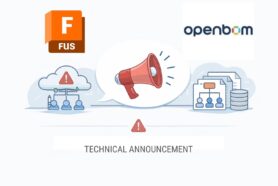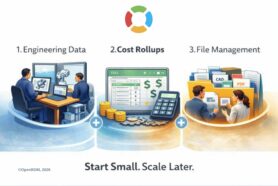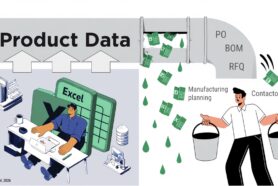
In today’s fast-paced business environment, companies need to be flexible and adaptable to stay competitive. This is especially true when it comes to PLM solutions, where the ability to customize and extend functionality is key. REST APIs provide a standard mechanism to customize and integrate new capabilities. REST API enables software applications to interact with each other over the internet. With REST API, companies can create custom integrations, develop new features, and extend the functionality of existing software platforms to meet their unique needs. In this article, I will share how OpenBOM user-defined tools can be combined with REST API to develop powerful and simple integrations between OpenBOM and other online (SaaS) solutions. I will use an example developed by one of OpenBOM’s partners – xLM Solutions.
xLM Solutions
xLM Solutions is a company that provides a variety of lifecycle solutions (x-any Lifecycle Cycle) custom software solutions and services to enhance the functionality of various PLM platforms. Check more on their website. With years of experience in the PLM industry xLM team are real professionals in PLM implementations and customizations. Their services range from custom development to integration, customization, migration, and support. The company is known for its expertise in PLM (Product Lifecycle Management) and is dedicated to helping businesses leverage the full potential of their software solutions to improve efficiency and reduce costs. With a team of experienced developers, architects, and consultants, xLM Solutions works closely with businesses to understand their unique requirements and provide tailored solutions to meet their needs.
OpenBOM User-Defined Commands and Digital Thread
Earlier this year, OpenBOM introduced a new customization mechanism – user-defined tools that can be used to expand OpenBOM functions. Custom commands are important capabilities because they allow users to automate repetitive tasks and streamline their data exchange workflows.
Custom commands are important elements of digital thread because they allow connecting processes together. It allows customers to develop custom applications and connect them to the OpenBOM platform. It supports real-time data access and connects OpenBOM to other enterprise applications and supply chains. This is where the digital thread begins.
This can significantly improve efficiency and productivity by reducing the need for manual input and data entry. Additionally, custom commands can also be used to implement specific business logic and processes, such as complex data validation rules, which would otherwise be difficult or time-consuming to implement manually.
REST API-Based Customizations
While OpenBOM offers a wide range of functionality, some businesses may require additional customization to meet their unique needs. This is where xLM Solutions comes in. xLM Solutions is a company that provides custom software solutions to enhance the functionality of OpenBOM and other software platforms.
One area where xLM Solutions excels is in demonstrating OpenBOM customization using REST API and user-defined commands. REST API is a programming interface that enables software applications to interact with each other over the internet. User-defined commands, on the other hand, are custom commands that enable businesses to extend the functionality of OpenBOM beyond its out-of-the-box capabilities.
By combining REST API and user-defined commands, xLM Solutions can provide businesses with a powerful toolset for customizing OpenBOM. For example, a business may require a custom command that exports data from OpenBOM to a specific location in a database. With REST API, xLM Solutions can create a custom integration that enables OpenBOM to communicate with the database, and with user-defined commands, xLM Solutions can create a custom command that exports data to the desired location.
Another example of OpenBOM customization using REST API and user-defined commands is in the creation of custom reports. A business may require a report that provides a specific view of their BOM data, such as a report that groups items by the supplier or by component type. With REST API, xLM Solutions can create a custom integration that enables OpenBOM to access the necessary data, and with user-defined commands, xLM Solutions can create a custom report that provides the desired view.
OpenBOM to Google Docs Integration Primer by xLM
In this current example, xLM Solutions provided a custom-built Google Docs integration with OpenBOM. The solution includes two custom functions to export data to Google Spreadsheets and Google Docs. Watch the video to learn more – it is self-explanatory.
The important thing about the solution that demonstrated xLM is how flexible it is. User-defined tools open the world of no-code customization for all OpenBOM customers. Combined with the services provided by xLM, our customers can develop multiple integrations with different tools and custom capabilities.
Conclusion
xLM Solutions can provide a powerful tool for any business to customize OpenBOM. The example of using REST API and user-defined commands is just the begining. This can enable businesses to extend the functionality of OpenBOM beyond its out-of-the-box capabilities and to create custom solutions that meet their unique requirements. xLM Solutions can work with businesses to create custom solutions that provide the desired functionality and to provide other customization services to help businesses leverage the full potential of OpenBOM and other software platforms. Check this out and imagine how many integrations you can develop by connecting user-defined tools and commands to other REST API programming capabilities.
REGISTER FOR FREE to check how OpenBOM can help you.
Best, Oleg
Join our newsletter to receive a weekly portion of news, articles, and tips about OpenBOM and our community.










